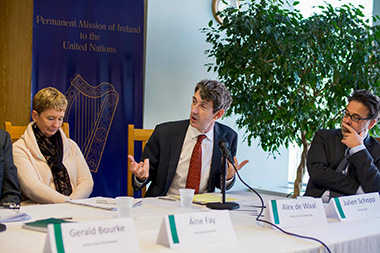Countries that have significantly lowered their hunger levels tend to have one thing in common.
“When you look at results over time since 2000, it’s clear that the countries that have really made inclusive economic growth a priority have made substantially more progress than the countries that have not,” said Summer Allen, research coordinator in the Markets, Trade and Institutions Division at the International Food Policy Research Institute (IFPRI.)
She was one of several speakers on a panel at the New York launch of the 2015 Global Hunger Index (GHI) at the Permanent Mission of Ireland to the United Nations. The report was jointly published by IFPRI, Welthungerhilfe, and Concern Worldwide.
Progress on Hunger
Among the report’s main findings, about one-third of countries decreased their GHI scores since 2000. Lower scores are associated with lower hunger levels. The scores are based on a formula that takes into account undernourishment, child wasting, child stunting, and child mortality. Among the biggest winners, 17 countries reduced their GHI scores by 50 percent or more, a substantial achievement, according to Allen.
Unlike GHI success stories from Brazil and Peru, many other countries have growing economies, but only some segments of the population benefit from this growth. Allen cited Zambia and Papua New Guinea as examples of countries that struggle with hunger despite abundant natural resources.
While the global progress toward reducing hunger levels is a positive trend, countries lacking data are a big concern, according to Allen. They include Burundi, Comoros, Eritrea, Sudan, and South Sudan—all countries with high levels of hunger in 2014. Although it’s unlikely that these countries underwent any rapid changesthe problem with missing data is that when we can’t measure hunger, we can’t make a case for what’s needed.
On behalf of the World Food Programme, Gerald Bourke, senior communications officer, called the 2015 GHI a “vital contribution to a very important conversation.”
He noted that the United Nations’ 2030 Agenda for Sustainable Development aims to eradicate hunger in 15 years. Over the past 15 years under the Millennium Development Goals, the world lifted 200 million people out of hunger. Today nearly 800 million people are hungry. “If we are to get to zero hunger in the next 15 years,” he said, “we’re going to have to quadruple that achievement.”
Famine on the Decline
In other remarks, the discussion focused on a historic achievement that almost went unnoticed. Calamitous famines—which kill more than one million people each—seem to have ended, said Alex de Waal. And we seem to be near the end of great famines, or those that kill more than 100,000 people, he noted, discussing a graph that showed the zigzag and steep drop-off of the global death toll from great famines since the 1870s.
“What is spectacular about this graph is the decline,” said de Waal, executive director of the World Peace Foundation and research professor at Tufts University. He authored a chapter in the 2015 GHI about armed conflict and hunger.
In 100 years—between 1870 and 1970—some 140 million people died worldwide from famines. That’s about 1.4 million deaths per decade. Over the last 25 years, less than 1.4 million have died in famines. “That’s quite an achievement,” he said.
While the world population grew from 1.3 billion in 1870 to about 7.3 billion today, famine moved in the opposite direction, he noted. de Waal asserted that the growth of freedom is behind the elimination of famine. “Where people were able to mobilize and bring pressure on governments,” he said, “then famine did not occur.”
Problems of Access
Despite the progress made, de Waal acknowledged that famine has not entirely vanished. In places like Somalia, South Sudan, and Syria, it is associated with conflict and the deliberate blockage of humanitarian assistance, he said. Greater pressure, he argued, must be exerted on warlords or others who prevent humanitarian assistance from getting through. US counterterrorism laws effectively handicap international agencies by preventing them from operating in places like Somalia and Syria. “That is an unnecessary impediment that can be lifted if the political will is there,” he said.
Áine Fay, president and COO of Concern Worldwide US, offered some insights from the ground level. In places like South Sudan and Syria, she said, “the biggest issue for our populations is our inability to access those most in need.” A few years ago, just after the beginning of the most recent conflict in South Sudan, Concern had access only to those living in refugee camps, which represented about 10 percent of the population. “The 90 percent of the population who most needed aid was entirely beyond reach.”
According to de Waal, “there is absolutely no ethical, political, or logistical reason why children living in any part of Syria, any part of Somalia, South Sudan, or Nigeria should not get that lifesaving assistance. As civil society has achieved this tremendous world historic conquest of calamitous famine over a century and a half, surely we can do this last little bit.”
If civil society took action in the form of a free press, citizens mobilizing, and processes for calling leaders to account, de Waal said, “these terrible famines inflicted by totalitarian systems would be gone.”







